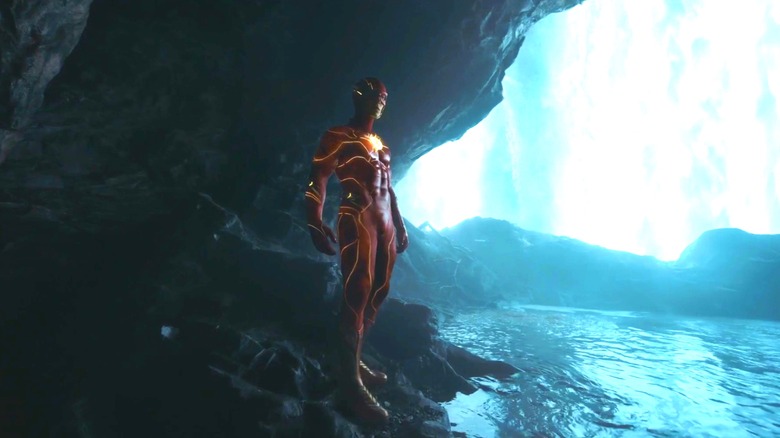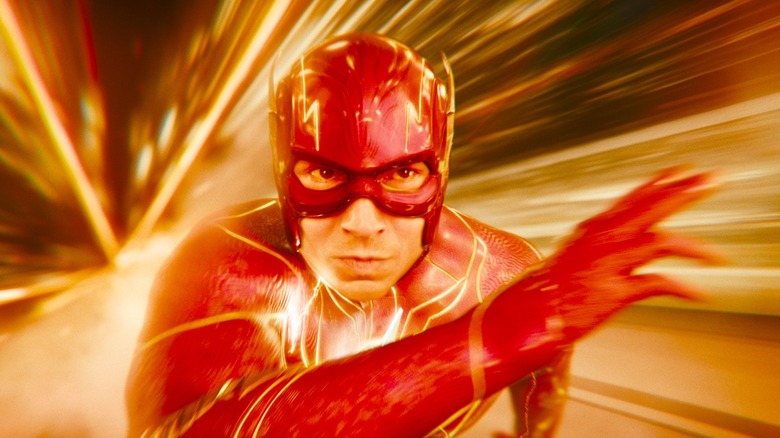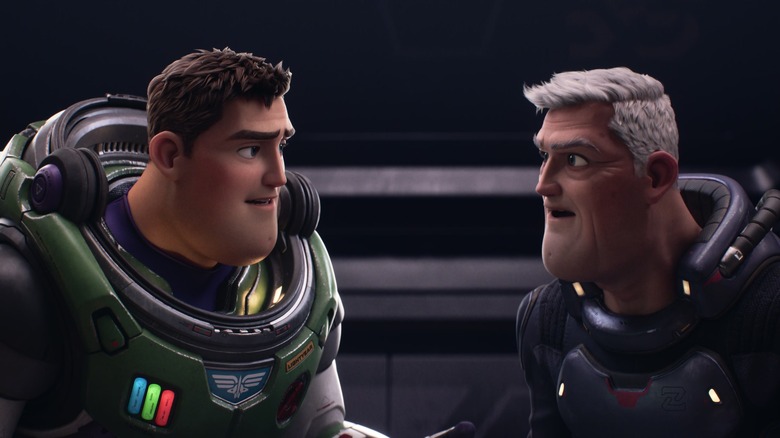The Flash Has A Lot In Common With A Maligned Pixar Movie
Warning: This article discusses major spoilers for "The Flash."
How fitting is it that the circumstances surrounding the release of "The Flash" represent a kind of "What if?" scenario in and of itself? As fans have known for quite some time, the plot of the Andy Muschietti-directed superhero movie follows Ezra Miller's Barry Allen as he seeks to change the future by going back and messing around with the past — unleashing all sorts of chaos upon the multiverse in the process. But while he's primarily focused on how different his life would've been if he could prevent his mother's murder and his father's subsequent (and unjust) incarceration, the film's long-delayed release invites one nagging hypothetical: Had it released on pretty much any of its earlier planned released dates, it could've beaten several other superhero movies to the multiverse punch. Instead, though the movie has its charms (check out /Film's review by Ben Pearson for more on that), it can't help but feel like a retread ... especially coming on the heels of "Spider-Man: Across the Spider-Verse."
But as much as "The Flash" feels vaguely reminiscent of a wave of similarly-themed movies like "Doctor Strange in the Multiverse of Madness," "Spider-Man: No Way Home," and more, there's actually another more unexpected title that this "solo" film about the fastest man alive shares quite a few commonalities with: Pixar's recent "Lightyear." Both involve a stubborn main character obsessed with righting the wrongs of the past. Both feature different twists on time travel. But there's also one oddly familiar choice that both scripts make regarding their respective plot twists relatively late in each film.
"The Flash" and "Lightyear" both present a mysterious antagonist who's ultimately responsible for each hero's predicament ... and who's ultimately revealed to be none other than the protagonist themselves.
The author of all his pain
It's a well-worn trope in both superhero media and science fiction as an overall genre. If a character messes around with forces far beyond their understanding — like, I don't know, the very fabric of space and time — then they only have themselves to blame if and when things spiral wildly out of control. Sometimes, that scenario is treated more literally with a reveal that the villain our hero comes up against again and again is actually ... themselves.
This is exactly the rug-pull that "The Flash" attempts. Driven by his pain over having essentially lost both his parents on the same traumatic day as a child, Barry literally runs away from his problems by using his super-speed to travel faster than he ever has before until he finds himself in some bizarre, metaphysical world he dubs the Chrono Bowl. With his memories arranged in an amphitheater-like collection, he discovers he can actually cut through space/time to revisit them at will and, naturally, chooses to make one tiny change in the past that will have unforeseen ripple effects. But just when Barry's about to make his way back to his present timeline, a ghoulish-looking entity comes out of nowhere and forcibly shoves him out of the Speed Force into a very specific universe that puts him face-to-face with his younger alternate self. Trapped together and forced to team up to save their world, the younger Barry eventually develops an even more intense obsession to change the past at all costs.
As we soon learn, every failure turns younger Barry into more and more of a twisted version of himself — until we realize he becomes the very monster that set all this chaos in motion in the first place. Does that sound familiar?
Seeing double
Neither "The Flash" nor "Lightyear" are the first movies to ever come up with this particular twist, obviously, but if I had a nickel for every time a sci-fi blockbuster released on the exact same weekend in June within the last year went back to this trope ... well, you know the rest of that meme. "The Flash" aims to shock audiences with the reveal that the horribly mutilated figure responsible for setting our Barry Allen on a crash course with his younger alternate is actually that same alternate version of Barry, but all grown up and physically scarred by countless failed attempts at changing his past. "Lightyear" pulls a similar trick with its own plot twist, drastically defying expectations by taking the villainous Zurg and unmasking him as a much older and more cynical version of Buzz Lightyear (Chris Evans) himself — one without any of the moral codes that the Buzz we know and love abides by.
Further linking the two otherwise very different movies is the fact that both main characters undergo such similar arcs. Much like young Barry Allen, our young and heroic Buzz is appalled to discover that even a different version of himself, forced to endure wildly different circumstances than his own, is capable of such desperate and evil acts. Similarly, young Barry shows such horror and guilt at what he's fated to become that his self-sacrifice — choosing to save the original Barry and destroy his villainous self in the process — rings that much truer.
This isn't the first time fantasy/sci-fi movies relied on the trope of doubles and it certainly won't be the last, but it's interesting to see how coincidence (or is it fate?) sometimes links certain movies together like this.
"The Flash" is currently playing in theaters.


